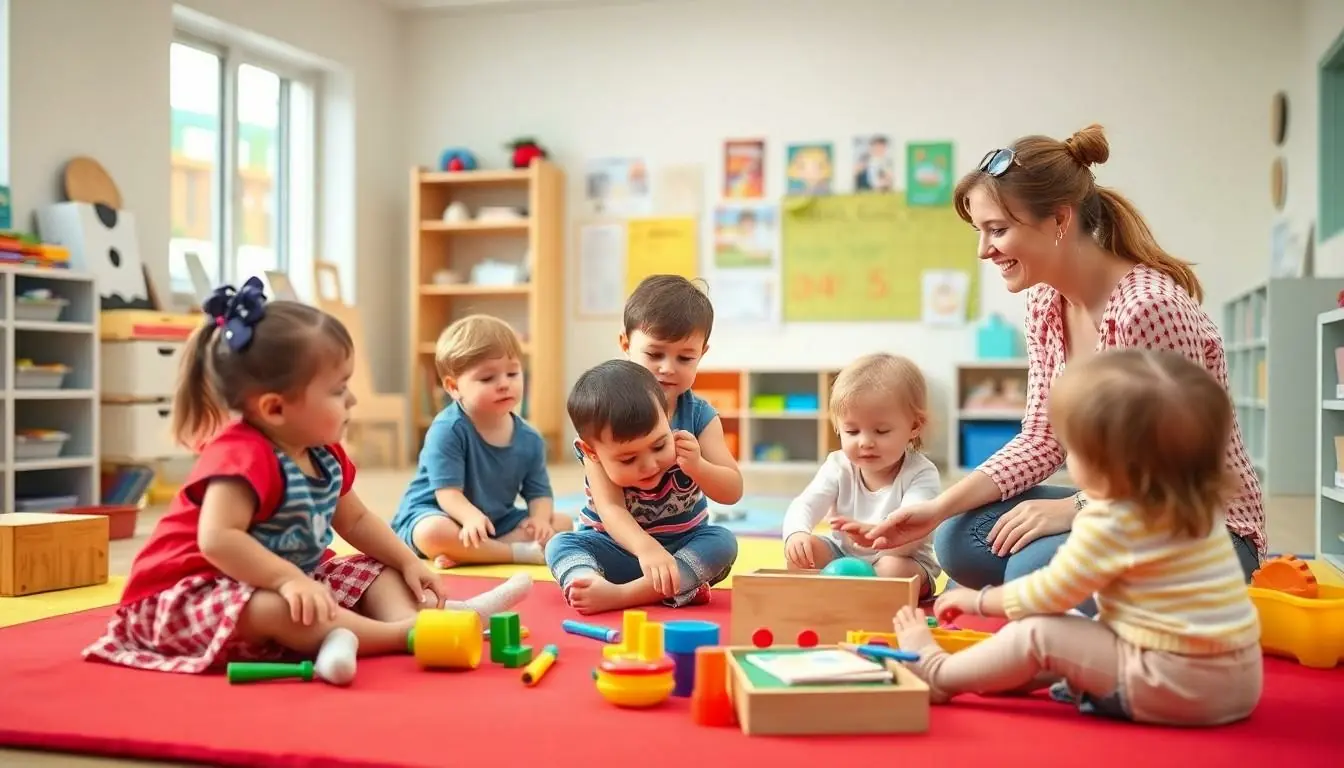Table of Contents
ToggleIn a world where toddlers can expertly navigate tablets before they can tie their shoes, understanding early childhood education requirements has never been more crucial. It’s not just about teaching ABCs and 123s; it’s about laying the groundwork for lifelong learning. So, what does it take to become a superhero in the realm of pint-sized learners?
Overview of Early Childhood Education Requirements
Early childhood education requirements vary by state and institution. Most programs necessitate a minimum of a high school diploma or equivalent. Associate’s degrees in early childhood education or related fields enhance job prospects.
Many employers favor candidates with bachelor’s degrees in early childhood education. Coursework typically includes child development, curriculum design, and classroom management. Programs often incorporate hands-on experience through student teaching.
Licensure requirements differ nationwide. Some states require teachers to pass a certification exam. Others mandate background checks to ensure child safety.
Continuing education plays a vital role in career advancement. Completing workshops or earning additional credentials helps educators stay current with teaching practices. Networking with professionals in the field also provides valuable insights and opportunities.
Professional associations support early childhood educators by offering resources and training. Membership in organizations, like the National Association for the Education of Young Children, offers access to conferences and best practices.
In addition to formal education, specific skills are crucial for success. Strong communication skills enhance interaction with children and parents. Patience and empathy contribute to building positive relationships in diverse classroom environments.
Adherence to state regulations ensures compliance with educational standards. Awareness of developmental milestones aids educators in assessing student progress. Understanding local community needs allows for tailored educational approaches.
Commitment to lifelong learning fosters growth in early childhood education. Engaging in ongoing professional development cultivates an enriched learning environment for young learners. Educators who prioritize their education contribute significantly to the foundations of future generations.
Types of Early Childhood Education Programs

Early childhood education programs vary significantly, offering distinct pathways for aspiring educators to gain credentials. These programs typically fall into two main categories: accredited degree programs and non-degree programs.
Accredited Degree Programs
Accredited degree programs provide robust training for future early childhood educators. Aspiring teachers often pursue associate’s or bachelor’s degrees in early childhood education. Such degrees generally cover a range of essential topics, including child development principles, behavior management strategies, and curriculum design tailored for young learners. Universities typically require hands-on experiences like student teaching to ensure that educators gain practical skills alongside theoretical knowledge. Graduates from accredited programs often find enhanced job opportunities and satisfaction, as these institutions adhere to recognized educational standards.
Non-Degree Programs
Non-degree programs offer alternative routes for individuals seeking careers in early childhood education. Often, these programs include certificates and workshops designed for immediate employment in childcare settings. Educators can benefit from flexible schedules and shorter commitment times compared to degree programs. Topics in these programs frequently focus on specialized areas such as infant care, preschool education, or creative play strategies. Through these courses, individuals gain crucial skills without the lengthy time commitment associated with degree programs, making it accessible for career changers or those entering the workforce quickly.
State-Specific Requirements
State-specific early childhood education requirements vary significantly across the United States. Each state establishes its own regulations, impacting licensure and curriculum standards for educators.
Licensing and Certification
Licensing for early childhood educators often entails completing specific educational criteria and passing certification exams. States like California mandate a Child Development Associate Credential for preschool teachers, while New York requires a bachelor’s degree in early childhood education or a related field. Certification exams assess knowledge and competencies relevant to teaching young children. Background checks remain a critical aspect of the licensing process, ensuring child safety and well-being in educational settings. Variations exist even among states with similar requirements, emphasizing the importance of understanding local guidelines for teaching credentials.
Continuing Education
Continuing education plays a vital role in maintaining a successful career in early childhood education. Many states require ongoing professional development hours to keep licenses active. Workshops, webinars, and conferences offer essential opportunities for educators to stay updated on the latest teaching strategies and regulations. States such as Texas recommend participation in a variety of training modules addressing child development, classroom management, and innovative teaching techniques. Engaging with professional associations like the National Association for the Education of Young Children further enhances knowledge and networking opportunities, supporting educators in their growth and effectiveness.
Essential Skills for Early Childhood Educators
Effective communication stands as a cornerstone for early childhood educators. They must articulate ideas clearly to students, parents, and colleagues, facilitating understanding and fostering strong relationships. Patience proves vital in managing different learning paces and behavioral challenges in young children. Empathy also plays a crucial role, enabling educators to connect with kids’ emotions and needs.
Awareness of developmental milestones enhances an educator’s ability to assess student progress accurately. Track growth and tailor instruction accordingly, ensuring each child receives the support necessary for success. Familiarity with community needs informs an educator’s approach and enriches the learning environment, allowing for culturally relevant teaching methods.
Creative thinking encourages innovation in lesson planning and classroom activities. Young children’s curiosity thrives in stimulating environments, where imagination and exploration are prioritized. Adaptability proves beneficial in addressing unexpected situations, from changes in routine to variations in student engagement.
A commitment to lifelong learning remains essential for professionals in early childhood education. Pursuing ongoing development through workshops and networking opportunities helps educators stay informed about the latest teaching strategies and regulations. Utilizing resources from professional associations supports continuous skill enhancement.
Leadership qualities empower educators to foster collaboration among staff while guiding young learners. Setting high expectations inspires children to achieve their goals. Strong organizational skills aid in managing lesson plans, classroom activities, and parent communications efficiently. Overall, these essential skills create a robust foundation for success in early childhood education.
Early childhood education plays a crucial role in shaping young minds and fostering a love for learning. The diverse requirements and pathways available for aspiring educators highlight the significance of tailored training and ongoing professional development. By understanding state-specific regulations and engaging with professional associations, educators can enhance their skills and adapt to the evolving landscape of early childhood education.
Ultimately, a commitment to lifelong learning and a focus on essential skills like communication and empathy are key to success in this rewarding field. As the demand for quality early childhood education continues to grow, dedicated educators will be instrumental in nurturing the next generation.




